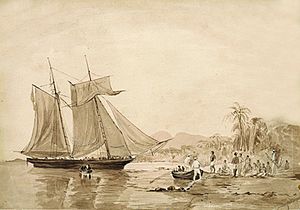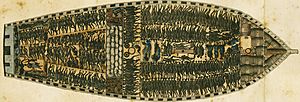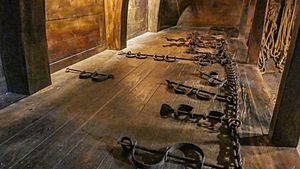Felix Doran (slave trader) facts for kids
Felix Doran (born 1708, died 1776) was an Irish slave trader. He was involved in at least 69 voyages that transported enslaved people. Doran moved to Liverpool in the 1740s and worked from the Port of Liverpool. His first ship used for the slave trade was called Lively, and his last one was named Essex.
Contents
Felix Doran's Early Life
Doran was born in Ireland. He was baptised and raised as a Catholic. It's thought he might have been born in County Down, where the Doran family name was common.
His Role in the Slave Trade
Felix Doran moved to Liverpool in the late 1740s. From the Port of Liverpool, he completed at least 69 voyages involved in the slave trade. His first recorded voyage was in 1737 with the ship Lively. The captain, Brooke Richmond, bought people who had been captured in Africa. These people were then sold in the West Indies.
After this, Patrick Dwyer captained Lively for five more slave voyages. On these trips, Doran took enslaved people from Africa and sold them in Barbados. Doran also owned other ships used for the slave trade. These included Hazard, Pearl, Vestal, Forde, Kildare, and Molly.
Doran was a partner in a company called Knight, Doran & Co. His partner was another slave trader named John Knight. They rented a building called the New Glasshouse on Liverpool's South Dock. This building belonged to the Corporation of Liverpool.
Records show that two ships, Judith and Lively, had certificates for plantations in Felix Doran's name.
Doran's final slave voyage was with the ship Essex in 1776. This ship was built in Liverpool in 1770 and carried four cannons. The ship was captained by Ralph Abraham. It picked up captured people at Bassa, and they were sold in Antigua. Out of 359 enslaved people who began the journey across the Atlantic Ocean, 31 died on board. Felix Doran himself died in 1776, before the Essex finished its journey and sold its captives.
Felix Doran's Family Life
Felix Doran was raised as a Catholic. However, he later married a woman who was not Catholic, named Mary Foxcroft. She was the niece of one of Doran's business partners in the slave trade, Thomas Foxcroft.
His son, also named Felix Doran (born 1758, died 1827), also became a slave trader. Felix Doran Jr. was responsible for 21 slave voyages, also operating from the Port of Liverpool.
His Death and Legacy
In his will, Felix Doran left £200 to his sister in Dublin. He also left her an additional £500 if his son, Felix Jr., died before turning 21. Doran was buried at St Nicholas's Church, Liverpool.
By 1780, Liverpool had become the largest port in the Atlantic world for the slave trade. Many streets and areas in Liverpool are named after slave traders. Dorans Lane is named after Felix Doran, even though he lived on a nearby street called Lord Street. Some writers say that Doran "seems to cling ghost-like to the area."
Sources
 | Valerie Thomas |
 | Frederick McKinley Jones |
 | George Edward Alcorn Jr. |
 | Thomas Mensah |




